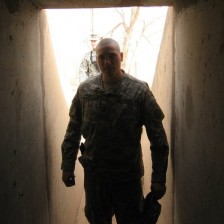As Veteran’s Day approaches, formerly known as Armistice Day, I am reminded of a story from one of my relatives who fought in the trenches of WW I. Think on those who currently serve and have come before us. While these men were able to kill each other all along the European front I can’t help but think; if politicians and political alliances could have gotten un-involved the men of the trenches probably could have solved the war over a pint and deck of cards. Whatever your predecessors have done their spirit carries on inside all of us.
This is a wonderful letter that my father received; written years earlier by a relative not in his direct line. There are foot notes in the bottom, but essentially him and his brother, along with all the other fighting aged men in the southern portion of Denmark were forced, or “drafted,” into the German Army. Because these were not native Germans they often saw action as expendable frontline men, and many Danish town were nearly depleted of men prior to the armistice on the 11th hour, of the 11th day, of the 11th month.
My father tells me that many of the older generation in these small towns still bear ill will towards what was done to their men by the Germans during the war to end all wars. I helped my father translate and interpret the military terminology as well as the footnotes. Enjoy.
Jon
Sorry, but the picture is not Nels; it’s simply one that caught my eye some time ago of two German soldiers at Verdun.
Aurillac(1) this 27-2-16
Today I have the opportunity to write a letter for the whole family; our correspondence is limited so we cannot write to everyone. Last year, in October, I was captured and am now in a French(2) prison camp where I am treated very well. I was drafted last year, the 2nd of May and was sent to Russia(3); in September we were sent to France where I was lightly wounded but doing well. I was wounded in the leg from a grenade fragment; it happened the day we were captured. I was taken to the hospital, where they were good to me, and now I am in a labor depot(4) where I am also treated nicely. My brother, Christian, has been with me the whole time; he has been by my side since the Carpathians, and he was wounded once on the front line(5) and was sent home for 14 days furlough. Thank God no one has fallen in the family at this time; so far as I know. From our county about forty(6) men have fallen; it is a terrible many. We all hope this war will soon end so we can return to our beloved. My mother and sister have been alone this whole time and there have not been any farm hands to hire. If some of you perhaps want to write me you can only write 16 lines on each side of the page; and if you write a card, you can only write 16 lines lengthwise, or eight if you write the other way; you cannot write and the address side and everything you write must be in Latin (7). I now conclude with many wishes for the whole family, and wish you all a happy new year, and may we be spared from this world war and well till we meet again.
Yours
Nels Kloster
(1) Aurillac is a small city located in the Auvergne of central southern France.
(2) Parts of modern Denmark have belonged to Germany and its previous kingdoms off and on since the early Middle Ages; which is the reason these Danish soldiers were drafted into the German army. The fact that they were Danish draftees may also have played into the good treatment they received from the French after being captured; this is the impression passed down by family members who have owned the letter.
(3) On May 1st Germany launched the Gorlice Offensive in Galicia, along the Carpathian front, with 8 divisions drawn from the western front and combining with the German 11th Army of 120,000 and Austrian 4th army of 80,000. included were 610 artillery guns that fired 700,000 shells; including gas canisters. On May 2nd infantry attacked the 41 apposing Russian divisions in front of Przemysl; although they focused on Golice to break through the Russian front. A twelve mile gap was opened. By September 18th the German war machine ground to a halt in the harsh terrain of eastern Poland. The Russian army had sustained 2 million casualties; 1 million of those were POWs (prisoners of war). The Austrian army strength alone had fallen from 500,000 to 200,000. At this time Germany and Austria shifted efforts towards Serbia and elsewhere; the winter ending the majority of combat in this region.
(4) A depot is a place in which supplies and materials are stored for distribution; most often relating to train stations at this time.
(5) Although no known proof exists, Christian was most likely wounded in the Carpathians because he appears to have been of good health when the two were captured, and the comment follows immediately the comment that they had fought together in the Carpathians.
(6) It was common practice at this time, as it had been in the past, to organize and develop units out if localized communities. This seems quite likely in this scenario since Nels knew the fate of many of his fellow community members. 40 men is indeed a terrible loss coming from a community dotted by farms and small towns.
(7) Latin was a common language still used by the educated of both sides; this enabled both sides to look over and censor the letter as necessary.
revised 10/1/06 by Steven Schoenherr | WWI Timeline |http://history.sandiego.edu/gen/ww1/1915a.html
accessed 22oct09
http://dictionary.reference.com/browse/depot
accessed 22oct09



Leave a Reply